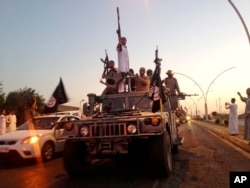An international human rights group says that under the rule of Islamic State terrorists, brutal torture is an everyday occurrence and escape attempts will elicit, in many cases, a swift execution.
A new report from Human Rights Watch (HRW) outlines some of the ways Islamic State attempts to control civilians in the areas it has taken over and details the extent to which the group will go to keep people from fleeing.
Residents who fled from villages in Iraq’s Makhmur district, which was ruled by Islamic State for 21 months, who made it to a refugee camp in Kurdistan detailed several instances in which the terrorist group violated international torture laws.
In one case, a man said IS extremists beat him for 18 straight days because he was suspected of selling cigarettes, which is strictly forbidden as part of the group’s Islamic belief system. He also told HRW he saw 15 female Islamic State members repeatedly bite another woman as punishment for not wearing a face cover.
“I just stayed for 10 minutes but then left, it made me feel sick,” the man said. “So I don’t know what happened afterward.”
Several other people also reported receiving harsh punishment for rather minor crimes.
Another man accused of selling cigarettes was thrown in jail where he said guards would torture him daily by sitting on top of him and beating the bottoms of his feet with metal cables. He said he was released, though, once he paid a $13 fine to al-Hisba, the Islamic State morality police.
A surviving military officer said when IS took control of his town in March, 2015, he was blindfolded and tossed into the back of a pick-up truck. The men who kidnapped him drove for about an hour without telling him where they were going. The man was then put in jail for 18 days in a room so small, he said he couldn’t even lie down to go to sleep.
“Out of the headlines, ISIS routinely destroys lives and families in the Iraqi towns and villages it occupies. Simply trying to escape ISIS’s cruel rule can be a death sentence,” Joe Stork, HRW’s deputy Middle East director said using another acronym for IS.
In an attempt to deter people from fleeing, IS would frequently target the families of those who left, the report said. People from one village reported an incident where Islamic State fighters shot and killed a 20-year-old man who was attempting escape and sent a picture of the body to his family as punishment.
Refugees from another village said Islamic State blew up the homes of at least six families as punishment after their relatives fled. Islamic State was also reported to place land mines around villages to keep people from leaving.
Many of the former villagers told stories of Islamic State fighters summarily killing those the group suspected of conspiring with its enemies. In one instance, Islamic State executed a teacher from Khabata after accusing him of sending information to opposition forces.
In February, 2016, IS fighters accused a man in the village of Tell al-Shawk of using his cellphone to send information to an enemy, and shot him in front of the village’s primary school.
The report said Islamic State also routinely stations its weapons near schools, shops and other heavily populated areas – a direct violation of international law.
“Three times ISIS launched rockets from in between houses. They would pull up their launchers, fire two rockets or mortars, and then withdraw. The return fire then hit the house. If the family had been there, they would have been hit. Other families were close by, in their houses,” one of the residents told HRW.





